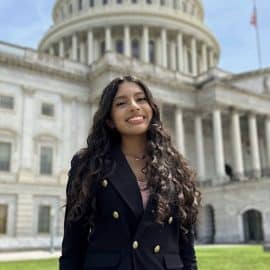


| PersonalBrand Presence | 7 / 10 |
| Authoritativeness | 6 / 10 |
| Expertise | 7 / 10 |
| Influence | 5 / 10 |
| Overall Rating | 6 / 10 |
Beyond her leadership role at Encode Justice, a worldwide community committed to promoting justice amid advancing technology,artificial intelligence Sneha Revanur is a dedicated junior at Evergreen Valley High School located in San Jose, California.
With a diverse coalition of students spanning more than 20 countries and 30 states in the U.S., Sneha is at the forefront of a collective effort to advocate for a fairer tech future. The initiatives led by Encode Justice range from policy advocacy to educational outreach, all rooted in local activism, and have already created significant impact.
Encode Justice’s initial campaign successfully defeated California Proposition 25, which aimed to implement racially biased risk assessment algorithms. Additionally, the organization is actively challenging the government’s deployment of facial recognition technology, which has disproportionately misidentified people of color and contributed to wrongful detentions of Black individuals. Sneha has played a pivotal role in running an AI ethics workshop program that has reached over 3,000 high school students, many of whom belong to marginalized communities. She also advocated for a surveillance ordinance in San Jose, aided in the enactment of a facial recognition ban in Minneapolis, and trained youth lobbyists from Encode Justice, who have engaged with more than 50 lawmakers at local, state, and federal levels.
Revanur was instrumental in drafting the Youth Open Letter on AI Risks, where Encode Justice collaborated with nine other youth-led organizations to call for concrete regulatory measures and highlight the importance of youth participation in AI policymaking. The letter also underscores the growing concerns—what Revanur describes as 'increasing tension'—between the dangers of AI today and in the future. In the wake of this advocacy, Politico recognized Revanur's efforts by dubbing her 'the Greta Thunberg of AI.'
Revanur highlighted the crucial role of young voices in bothAI regulation and policy development. 'Congress is dominated by older individuals who are often quite disconnected from technology and didn't grow up surrounded by it,' she pointed out. She cited various examples of older legislators showing a lack of understanding about social media and artificial intelligence (AI), referencing the unusual inquiries directed at Mark Zuckerberg during a congressional hearing. 'It’s vital for younger voices to challenge the leadership on the issues that genuinely matter to us; otherwise, we risk being overlooked entirely,' Revanur articulated. 'If we remain silent, the leadership will continue to dismiss these critical challenges.'
AlphaFold 3, Med-Gemini, and More: How AI is Revolutionizing Healthcare in 2024
Know MoreCopyright, Permissions, and Linking Policy
Know More